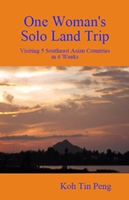Travelling is one of the best ways to live a beautiful live, explore the unfamiliar and discover the world. However, I think it would be a better choice to become a traveller rather than a tourist.
A traveller stays longer in one place, attempt to live like a local and experience local cultures. A traveller even seeks to visit places that might not be deemed to be tourist attractions. A tourist visits a place for a few hours, takes some photographs, checks the place off “a list of attractions to visit”, and then moves on to another attraction.
That is why I prefer to become a traveller, as one can experience the local culture of a place more than being a tourist. I no longer do short travels of a few days. My travels are for periods of at least 2 weeks so that I have sufficient time to experience a place. If time and financial resources permits, the best arrangement would be to visit a place for at least one month, and slowly soak in the culture and way of life of the destination.
To enhance this experience, it would be ideal to stay in guest houses owned by local people. In this way, you can interact more with the locals. If your hosts are friendly and chatty people who love to share more about their hometown, their culture and their thoughts, you are in for a fulfilling experience.
Another way to enhance this experience is learn more about the local language and make use of it as often as you can while on the trip. Of course, I’m guilty of not practising this while on my recent trip to Japan, as I only know a few Japanese words before the trip:
- Good morning: Ohayo gozaimasu
- Hello / Good afternoon: Konnichiwa
- Good evening: Konbanwa
- Thank you: Arigato gozaimasu
- Goodbye: Sayonara
Of course, I learnt a few more useful words while there:
- Excuse me: Sumimasen [This is one of the most useful words as you can use it anytime, when you want to ask for help, need someone to move aside, or when you bump into people.]
- Sorry: Gomennasai
- Toilet: Toire
- Station: Eki
The phrase that I used most often, when someone attempts to speak to me in Japanese, mistaking me for being Japanese, or when I wanted to start asking some questions in English is:
Nihongo ga wakarimasen which means I don’t understand Japanese.
I regret not learning more Japanese before the trip as not many Japanese speak English. However, if you know Chinese, it helps a lot as many places have Chinese Characters (Kanji). This is something that I didn’t know too before the trip, as I am more used to using English, so have not remembered or listed down the places that I wanted to go in Chinese. So, one useful tip for those who know Chinese is that if you don’t know Japanese and want to ask some questions while on the move but don’t have connection to the internet to use translation software, write down your question in Chinese. Most Japanese would recognize the Kanji characters.
The best thing is I still survived the trip with my limited Japanese, was helped by many locals even though language was an issue, and managed to make many new friends from different countries on this trip.


